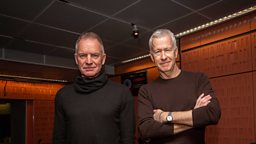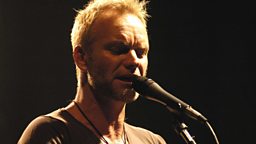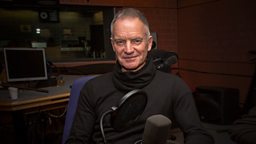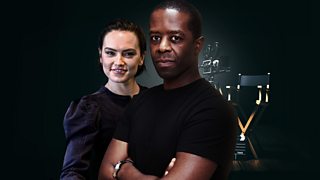Sting: Nine things we learned from his This Cultural Life interview
Over a career spanning almost 50 years, Sting has been a member of The Police, once the biggest band in the world, and a hugely successful solo artist. He’s won 17 Grammy Awards and sold over 100 million records.
On This Cultural Life, Sting tells interviewer Wilson about the royal encounter that changed his life, why turning 70 changes nothing, and the time Miles Davis told him he has a massive head. Here are nine things we learned.

1. The Queen Mother made him realise the possibilities of the world
Sting, born Gordon Sumner, grew up in Wallsend, North Tyneside, on a street that ran down to the docks. He’d see ships every day. “As a symbol, that was pretty profound,” he says. “Ships are launched and go way out into the world. I’d see thousands of shipyard workers pass my door every day. I wondered, as a kid, if that was my destiny.” When new ships were launched, dignitaries would come from London to christen them. On one occasion, when Sting was a boy, the Queen Mother came. “I remember being given a Union Jack to wave,” he says. “She caught my eye and I thought, I’ve been noticed by a creature from another planet.” That moment made him realise there’s a bigger life out there than the one I’m being offered. That was a touchstone for me.”
When I first heard All Shook Up by Elvis Presley, I remember having a kind of catatonic fit, rolling around on the floor with excitement.
2. His mum encouraged him to sing
Both Sting’s parents were musical. His earliest memory is watching his mum’s feet as she played the piano. “She would also bring records into the house,” he remembers. “She would bring in early 78s of people like Jerry Lee Lewis… and Little Richard. When I first heard All Shook Up by Elvis Presley, I remember having a kind of catatonic fit, rolling around on the floor with excitement… It was such a fresh sound.” Although most of his family had some kind of musical leaning, he credits his mum with inspiring him the most: “My mum was a big musical influence on me. She encouraged me to play and sing, so I owe a great deal to her.”
3. The gift of a guitar gave him a chance to escape
When Sting was a boy, one of his "uncles" (“He wasn’t my real uncle, but everyone on the street was your uncle... ”) emigrated to Toronto and left behind a Spanish guitar. “He bequeathed it to me,” he says. “It had five rusty strings. I fell on that thing like it was my saviour.” He bought a book and started to teach himself guitar. “I didn’t speak to anybody for days, but at the end of a few weeks I could knock out a tune… I thought, this is a way out.”

4. The Beatles inspired him to believe he could do it
Sting hoped music could give him a path to a different life, but he’d never seen anyone like him do it. That is until he came across The Beatles. “I was in the swimming baths and I remember being in the changing rooms and the radio came on, [playing] Love Me Do.” He loved the music, but was also amazed that these were normal, working-class guys like him who were singer-songwriters. “They gave the generation below permission to do the same thing,” he says. “Before them there had been singers and there had been songwriters. The songwriters lived in Tin Pan Alley… the singers were something else… It rarely happened that the two things came together… I think The Beatles were the first [British] example of that hybrid of singer and songwriter. I thought, I could try that.”
Sting hoped music could give him a path to a different life, but he鈥檇 never seen anyone like him do it.
5. He was a teacher for two years
In the years between discovering The Beatles and becoming a pop star himself, Sting was briefly Mr. Sumner, a teacher at a Newcastle junior school. “I taught everything,” he says. “Maths, bit of reading, bit of poetry, bit of art, bit of football. I would sit and play music to them. I’d play the guitar and teach them songs. I enjoyed that more than anything. I taught for two years.” He eventually decided he needed to try music full-time. “I went to the headmistress and said, ‘I need to resign at the end of the school year.’ She said, ‘Well you know you’ll lose your pension?’ And she was right.”
6. His popularity caused tension in The Police
Sting joined The Police in 1977. “It was just happenstance. I met Stuart Copeland [the band's drummer]… in Newcastle and he said, ‘If you’re ever in town, give me a call.’ That led to being in what was the biggest band in the world at one point.” The Police only recorded together for a little over five years (they officially disbanded in 1986). Sting says that tension in the band was in part driven by the media's focus on him. “I was the singer in the band and I did become the sole songwriter,” he says. “The press would latch on to the lead singer. It’s a common thing. So there was tension in the band.” The Police briefly reunited in 2007 for a world tour. “It was a sentimental decision,” says Sting. “I’m glad everyone did well out of it. People enjoyed it. Then I needed to move on.”
7. He decided to leave The Police at The Secret Policeman’s Ball
Sting says that his decision to leave the band was made when he was invited to play solo at The Secret Policeman’s Ball, a benefit show for Amnesty International, in 1986. “They just wanted me to sing a song on my own with a guitar,” he says. “I performed Roxanne and Message In A Bottle… alone, just with a guitar and my voice. It was the moment that I thought, I can do this on my own. Not that I was ungrateful for the band, but I saw a way of evolving.”
8. Miles Davis told him he has a huge head
One of Sting’s biggest musical influences is Miles Davis. When a friend gave him the album Bitches Brew it was “like he was administering some powerful psychedelic drug into my vein.” Sting actually worked with Davis. The first thing Davis said when they met was “'You’ve got the biggest MF head in the world.’ Really, Miles? What do you mean? ‘Saw you in a movie, man. Your head filled the whole MF screen!’” Davis asked Sting to translate the Miranda Rights into French and read them for the album You’re Under Arrest. “My French isn’t that good. I’ve got O-level French… So I get on the phone to [his wife] Trudie, who speaks fluent French…She said, ‘Are you on drugs? What’s going on here?’”
9. He’s 70 but has no plans to slow down
Sting turned 70 in October 2021. He’s still going strong, releasing two albums, Duets and The Bridge, in 2021. “I think what drives me on has always been the same thing – curiosity,” he says. “I’m curious about music. It’s an interminable puzzle to me. You can never get to a point where you say, ‘Oh I know everything about composition.’” He tries to solve that puzzle every day. “Music is a puzzle and life is a puzzle. I’m curious about why we’re all here. What the hell is this? I don’t know what it is. I’m curious about it. I’m aware of it. I’m grateful for it.”

More from Radio 4
-
![]()
This Cultural Life: Kenneth Branagh
Actor and film-maker Kenneth Branagh reveals his cultural influences and inspirations.
-
![]()
That Dinner of '67
Kenneth Branagh stars in Tracy-Ann Oberman鈥檚 new play about the making of a classic movie.
-
![]()
Add to Playlist
Cerys Matthews and Jeffrey Boakye create a playlist no computer could.
-
![]()
Front Row
Live magazine programme on the worlds of arts, literature, film, media and music.





